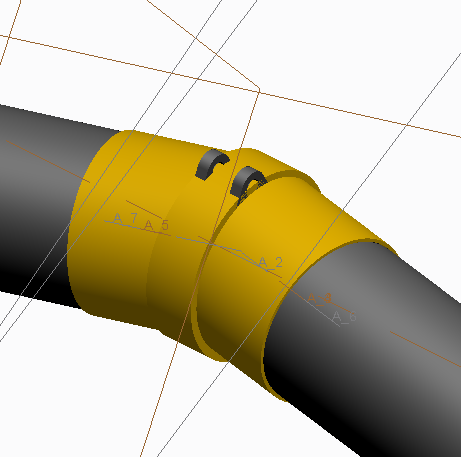Community Tip - Want the oppurtunity to discuss enhancements to PTC products? Join a working group! X
- Community
- Creo+ and Creo Parametric
- Analysis
- Trimming Solids and Part Modeling Question
- Subscribe to RSS Feed
- Mark Topic as New
- Mark Topic as Read
- Float this Topic for Current User
- Bookmark
- Subscribe
- Mute
- Printer Friendly Page
Trimming Solids and Part Modeling Question
- Mark as New
- Bookmark
- Subscribe
- Mute
- Subscribe to RSS Feed
- Permalink
- Notify Moderator
Trimming Solids and Part Modeling Question
NX user here learning Creo 2.0. I'm modeling a part with several revolved surfaces which overlap. Shown below, the gray is reference "independent geometry. Three revolved sketches form three solids as shown. Is there a way to combine the separate revolved models into one. This is within a part file and not separate parts in an assembly. In NX I would use a function called "unite" with combines the solids into one. I'm also not sure if the surfaces need to be trimmed first before the model entities are combined, also, I'm not even sure if this is acceptable practice in Creo. Thanks

This thread is inactive and closed by the PTC Community Management Team. If you would like to provide a reply and re-open this thread, please notify the moderator and reference the thread. You may also use "Start a topic" button to ask a new question. Please be sure to include what version of the PTC product you are using so another community member knowledgeable about your version may be able to assist.
- Labels:
-
General
- Mark as New
- Bookmark
- Subscribe
- Mute
- Subscribe to RSS Feed
- Permalink
- Notify Moderator
Hi Mark,
I can see two basic approaches to this in Creo.
The first is to just revolve each feature as a solid, in which case they will all merge into the part anyway - job done. Creo is based on a philosophy of 'one part, one solid' as an analogue of real life - anything with more than one part is an assembly of, well, more than one part.
The second approach is to model each revolve as a surface, and with complex models this can be a very robust approach. You can either make each surface (or 'quilt') closed, and solidify each one independently and they will merge together as above (no trimming required); or you can Merge each quilt into the previous one, then solidify the resulting quilt (this is the basis of the robustness I mentioned).
- Mark as New
- Bookmark
- Subscribe
- Mute
- Subscribe to RSS Feed
- Permalink
- Notify Moderator
Hmmm? So, its acceptable to have separate solids which make up one part? As an experiment and to my surprise, I was able to create a "round" fillet feature with two of the solids in my file. In NX of course, it is treated as separate solids and a fillet wouldn't be possible.
- Mark as New
- Bookmark
- Subscribe
- Mute
- Subscribe to RSS Feed
- Permalink
- Notify Moderator
I'd say more than acceptable - it's the default approach. They're not really separate solids, just separate (solid) features. As soon as you add each new one it just becomes part of the part (if that makes sense!).
I'm not familiar with NX, but in Creo it's generally considered good practice to build up your part using many, simple features, rather than trying to cram all the detail into a single feature. Therefore building up your solid incrementally this way is absolutely fine.
- Mark as New
- Bookmark
- Subscribe
- Mute
- Subscribe to RSS Feed
- Permalink
- Notify Moderator
From talking to other NX users (and my very limited experience), the first thing you'll need to understand about CREO is that a part model is one single part as represented in the physical world. Creo does not do the multiple "bodies" in a part. If you have 2 "things" in creo, you will have 2 part models (separate .prt files) and one assembly model (separate .asm file).
You'll have to get over multiple body part files, they don't exist in Creo.





